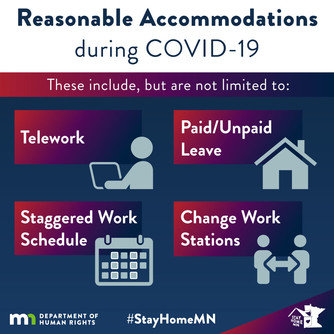During this time of continued social change and economic uncertainty, their civil rights must remain protected if Minnesotans with disabilities are to have full access to all aspects of life—including employment.
Safeguarding the right to request reasonable accommodations in the workplace means protecting the right to current and future employment for people with disabilities.
The Minnesota Council on Disability brings you the following message from the Minnesota Department of Human Rights:
Individuals with disabilities can request “reasonable accommodations” from employers subject to the Americans with Disabilities Act and the Minnesota Human Rights Act.
If you have a disability that affects your risk for contracting COVID-19 or being harmed if you do contract the virus, you have the right to request a reasonable accommodation from your employer.
Generally, people with an underlying health condition (compromised immune system, currently or recently pregnant, heart disease, lung disease, etc.) can request a reasonable accommodation. Please visit the Minnesota Department of Health’s website for a comprehensive list of underlying health conditions.

Examples of reasonable accommodations include, but are not limited to:
- teleworking
- paid, sick, unpaid leave
- staggered work schedules
- changing workstations to practice social distancing
When requesting a reasonable accommodation, describe the nature of the accommodation and how it will assist you in performing the essential functions of your job.
Reminders for Employers
Employers may ask employees if they are experiencing influenza-like symptoms, such as a fever, chills, a cough, or a sore throat. Employers must maintain all information about employee illness as a confidential medical record in compliance with state and federal law.
During a pandemic, employers may not ask employees who do not have known or apparent influenza symptoms whether they have a medical condition the CDC says could make them vulnerable to influenza complications. Under no circumstances may an employer make decisions based on stereotypes or bias.
Suppose employees voluntarily disclose to their employer that they have a medical condition or a disability that places them at higher risk of COVID-19 complications. In that case, the employer must keep this information confidential.
Employers may not assume employees with known medical conditions or disabilities are at heightened risk of complications from COVID-19.